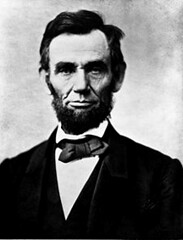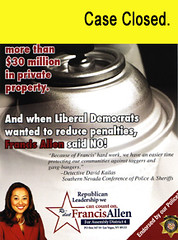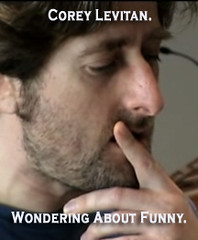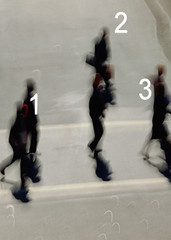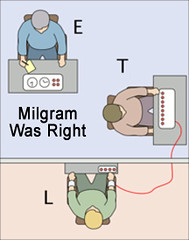Years ago, when John Corcoran told me that almost half of his students were not able to read beyond a third grade level, I didn't want to believe him. And yet, I believed him.
I believed him because third grade was a pivotal year in my education too. It was the same year that my grandmother made the decision to have me repeat the third grade outside of the public school system. Had nothing changed, I would have landed on the wrong side of a statistical division.
According to the John Corcoran Foundation, two-thirds of students who cannot read proficiently by the end of fourth grade will end up in jail or on welfare. Not all of them do. Corcoran was a teacher.
He learned to cheat, but only cheated himself.
As Corcoran progressed through school, he became more and more resourceful in hiding his illiteracy behind his natural aptitude for math, athletic prowess and deep friendships. He hid it so well, in fact, that he taught bookkeeping, social studies, and physical education for several years.
Living this lie wasn't easy for him, he told me, but it was not nearly as painful as not being able to help students who faced a similar problem. They could not read and he could not teach them.
Corcoran eventually did learn to read, but not until long after he left teaching and entered real estate. He was 48 years old at the time and an exception to the rule. Most people never learn to read.
A brief look at the growing literacy problem in the United States.
There is a growing literacy problem in the United States and our self-confidence, much like Corcoran's self-esteem, makes us blind to it. According to the U.S. Department of Education, 14 percent of adults in the United States cannot read (the same number of people who do not use the Internet) and, according to the National Assessment of Adult Literacy (NAAL), this number swells to 40 percent when counting those who only possess level one reading skills (marginally functional).
High school graduation is not an indicator. As many as one in five students graduate without being able to read. About one in four graduate without being proficiently literate. One recent study, OECD Skills Outlook 2013, placed the United States 16th in literacy proficiency (among 23 countries).
The same organization warned that the U.S. was the only country among 20 OECD free-market countries where the current generation is less well educated than the previous one. It published this finding as part of the National Commission on Adult Literacy in 2008. It's not any better today.
Individual career paths aside, literacy is a family matter.
Any time I step on stage or in front of a classroom, most people cannot imagine me as anything but a writer. Even with other occupational titles, writing has provided my career with a strong foundation. I write approximately 10,000 to 15,000 words a week (excluding email and social networks), which is the equivalent of a novel every other month (and the reason I don't write a novel every other month).
Ironically, I can imagine my career path without ever becoming a writer. From the onset, I wasn't very good at it because strong writing is indicative of being a strong reader. I wasn't a strong reader.
Reading came much later for me. I didn't learn to appreciate it until seventh grate. Writing came even later. My skill sets were only passable up until my freshman year. Both have stories for another time.
The point is that I can imagine it because I had to imagine it. But what I could not imagine would be the inability to help my daughter when she needed it most. She reads with confidence now.
Three days this week with literacy. Maybe you could connect to one.
 Thursday is All Hallows Read. Most people pass out candy, but Neil Gaiman continues to make the case that people could pass out books instead. He calls the campaign All Hallows Read, a program that inspires more stories and less sweets for Halloween.
Thursday is All Hallows Read. Most people pass out candy, but Neil Gaiman continues to make the case that people could pass out books instead. He calls the campaign All Hallows Read, a program that inspires more stories and less sweets for Halloween.
I wrote about the program last year, including five titles that have always conjured up an appropriate spirit for the season. Feel free to add The Ocean At The End Of The Lane, written by Gaiman. Coraline is another family favorite. The film is part of my family's Halloween lineup.
 Friday is National Family Literacy Day. The National Center For Family Literacy (NCFL) is hosting a fundraising challenge for literacy. Proceeds from the campaign will help the center continue its work, which has helped more than one million families make educational and economical progress.
Friday is National Family Literacy Day. The National Center For Family Literacy (NCFL) is hosting a fundraising challenge for literacy. Proceeds from the campaign will help the center continue its work, which has helped more than one million families make educational and economical progress.
The reason family literacy is so important is that children's reading scores improve dramatically when their parents become involved and help them learn to read. This isn't possible without literate parents so the program goes a long way improving the household. The NCFL is my friend Geoff Livingston's account and he is raising funds along with hundreds of others. They have a "thunderclap" scheduled.
Saturday is the Vegas Valley Book Festival. The Vegas Valley Book Festival is the largest literary event in Las Vegas, bringing together hundreds of writers, authors, artists, and illustrators to celebrate literacy and creativity. All programs and events are open to the public. Admission is free.
As social media director for AIGA Las Vegas, I have been overseeing elements of the social media campaign, including an event schedule on Facebook. If you are in Las Vegas this Saturday, there isn't a better way to promote family literacy and art appreciation. There is also an event kick off tonight with Catherine Coulter as this year's keynote.
One last thing for my own curiosity: What are you reading and why? I really would like to know. It's important because you never know who it might inspire next because words inspire lives. They inspired mine.
I believed him because third grade was a pivotal year in my education too. It was the same year that my grandmother made the decision to have me repeat the third grade outside of the public school system. Had nothing changed, I would have landed on the wrong side of a statistical division.
According to the John Corcoran Foundation, two-thirds of students who cannot read proficiently by the end of fourth grade will end up in jail or on welfare. Not all of them do. Corcoran was a teacher.
He learned to cheat, but only cheated himself.
As Corcoran progressed through school, he became more and more resourceful in hiding his illiteracy behind his natural aptitude for math, athletic prowess and deep friendships. He hid it so well, in fact, that he taught bookkeeping, social studies, and physical education for several years.
Living this lie wasn't easy for him, he told me, but it was not nearly as painful as not being able to help students who faced a similar problem. They could not read and he could not teach them.
Corcoran eventually did learn to read, but not until long after he left teaching and entered real estate. He was 48 years old at the time and an exception to the rule. Most people never learn to read.
A brief look at the growing literacy problem in the United States.
High school graduation is not an indicator. As many as one in five students graduate without being able to read. About one in four graduate without being proficiently literate. One recent study, OECD Skills Outlook 2013, placed the United States 16th in literacy proficiency (among 23 countries).
The same organization warned that the U.S. was the only country among 20 OECD free-market countries where the current generation is less well educated than the previous one. It published this finding as part of the National Commission on Adult Literacy in 2008. It's not any better today.
Individual career paths aside, literacy is a family matter.
Any time I step on stage or in front of a classroom, most people cannot imagine me as anything but a writer. Even with other occupational titles, writing has provided my career with a strong foundation. I write approximately 10,000 to 15,000 words a week (excluding email and social networks), which is the equivalent of a novel every other month (and the reason I don't write a novel every other month).
Ironically, I can imagine my career path without ever becoming a writer. From the onset, I wasn't very good at it because strong writing is indicative of being a strong reader. I wasn't a strong reader.
Reading came much later for me. I didn't learn to appreciate it until seventh grate. Writing came even later. My skill sets were only passable up until my freshman year. Both have stories for another time.
The point is that I can imagine it because I had to imagine it. But what I could not imagine would be the inability to help my daughter when she needed it most. She reads with confidence now.
Three days this week with literacy. Maybe you could connect to one.
 Thursday is All Hallows Read. Most people pass out candy, but Neil Gaiman continues to make the case that people could pass out books instead. He calls the campaign All Hallows Read, a program that inspires more stories and less sweets for Halloween.
Thursday is All Hallows Read. Most people pass out candy, but Neil Gaiman continues to make the case that people could pass out books instead. He calls the campaign All Hallows Read, a program that inspires more stories and less sweets for Halloween.I wrote about the program last year, including five titles that have always conjured up an appropriate spirit for the season. Feel free to add The Ocean At The End Of The Lane, written by Gaiman. Coraline is another family favorite. The film is part of my family's Halloween lineup.
 Friday is National Family Literacy Day. The National Center For Family Literacy (NCFL) is hosting a fundraising challenge for literacy. Proceeds from the campaign will help the center continue its work, which has helped more than one million families make educational and economical progress.
Friday is National Family Literacy Day. The National Center For Family Literacy (NCFL) is hosting a fundraising challenge for literacy. Proceeds from the campaign will help the center continue its work, which has helped more than one million families make educational and economical progress.The reason family literacy is so important is that children's reading scores improve dramatically when their parents become involved and help them learn to read. This isn't possible without literate parents so the program goes a long way improving the household. The NCFL is my friend Geoff Livingston's account and he is raising funds along with hundreds of others. They have a "thunderclap" scheduled.
Saturday is the Vegas Valley Book Festival. The Vegas Valley Book Festival is the largest literary event in Las Vegas, bringing together hundreds of writers, authors, artists, and illustrators to celebrate literacy and creativity. All programs and events are open to the public. Admission is free.
As social media director for AIGA Las Vegas, I have been overseeing elements of the social media campaign, including an event schedule on Facebook. If you are in Las Vegas this Saturday, there isn't a better way to promote family literacy and art appreciation. There is also an event kick off tonight with Catherine Coulter as this year's keynote.
One last thing for my own curiosity: What are you reading and why? I really would like to know. It's important because you never know who it might inspire next because words inspire lives. They inspired mine.















